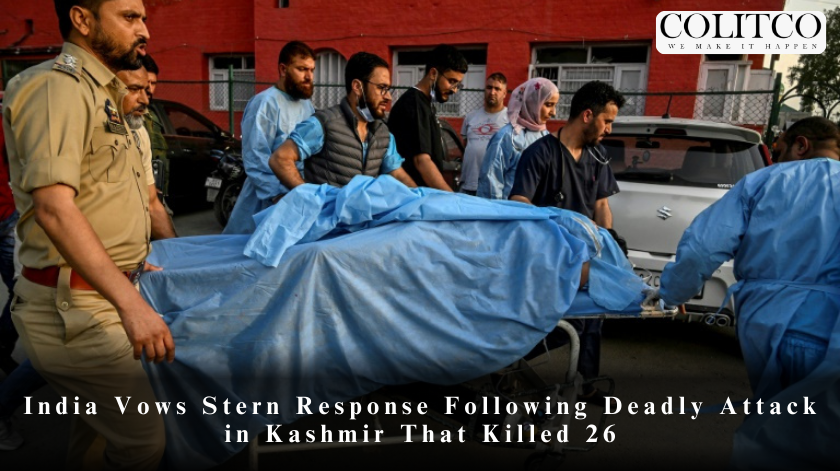In one of the deadliest attacks on civilians in Indian-administered Kashmir in recent years, gunmen opened fire on a group of tourists in the Pahalgam area, killing 26 men and injuring several others. The attack, which unfolded over 20 minutes with the use of automatic weapons, has sent shockwaves across the country and heightened tensions with neighboring Pakistan.
Prime Minister Modi Chairs Emergency Meeting
India’s government has responded swiftly, with Prime Minister Narendra Modi cutting short a state visit to Saudi Arabia to chair an emergency meeting of the Cabinet Committee on Security (CCS) in New Delhi. Speaking shortly after the meeting, Modi condemned the “heinous act” and vowed that the attackers “will not escape justice.” The prime minister emphasized that those responsible, including their sponsors, would be held accountable.
Widespread Security Crackdown
Security forces have launched a massive manhunt across the Kashmir Valley, with more than 1,500 individuals detained for questioning in the Jammu and Kashmir region. Police have released sketches of suspected assailants believed to be affiliated with The Resistance Front (TRF), a relatively obscure militant group that has claimed responsibility for the attack via social media.
Diplomatic Fallout with Pakistan
India’s Foreign Secretary Vikram Misri addressed a packed press conference, delivering a series of measures aimed at isolating Pakistan diplomatically. Among the most significant announcements was the suspension of the SAARC visa exemption programme for Pakistani nationals. “All visas issued under this scheme are cancelled,” Misri said. “Pakistani nationals currently in India under this provision have 48 hours to leave the country.”
Further measures include the closure of the Attari-Wagah border crossing and the withdrawal of Indian military and diplomatic personnel from Pakistan. In a tit-for-tat move, Pakistani defence, navy, and air attachés posted at the High Commission in New Delhi have been declared persona non grata and asked to leave within a week. Misri also confirmed the suspension of the Indus Waters Treaty, a long-standing water-sharing agreement between the two countries.
Also Read: AMD’s New Driver Levels Up Oblivion Remastered with AI-Powered FSR 4
Questions Over ‘Normalcy’ in Kashmir
The incident has raised serious questions about the security situation in Kashmir, particularly in the aftermath of the Indian government’s 2019 decision to revoke the region’s semi-autonomous status. While New Delhi has repeatedly claimed that peace and development have returned to the valley, critics argue that such declarations mask growing discontent and unresolved political issues.
Ajai Sahni, executive director of the South Asia Terrorism Portal, criticized the government’s “normalcy” narrative. “There is no true normalcy in Kashmir,” Sahni stated. “The illusion of peace creates complacency, which emboldens such attacks. A political solution is crucial if long-term stability is to be achieved.”
Global Condemnation and Regional Tensions
International reactions have poured in swiftly. France’s President Emmanuel Macron took to X (formerly Twitter) to express his solidarity with India and condemn the “heinous terrorist attack.” Qatar’s Foreign Ministry also issued a strong statement denouncing the violence and reaffirming its stance against terrorism in all forms.
Meanwhile, Pakistani authorities have denied any involvement in the attack, urging restraint and dialogue. However, Indian officials have cited the timing of the assault—coming just days after a provocative speech by Pakistan’s Army Chief Asim Munir—as further evidence of Islamabad’s complicity.
India Weighs Its Options
Security analysts have warned that India’s options are complex. While military retaliation remains on the table, diplomatic pressure and internal counterterrorism operations are more likely in the immediate term. “This is an act of war,” said Tara Kartha of the Centre for Land Warfare Studies in New Delhi. “Unless Pakistan moves quickly to denounce the attack and take visible steps against those responsible, the risk of escalation will grow.”
Grief and Uncertainty for Victims’ Families
For the families of the victims, however, the focus remains on grief and justice. Most of the victims were Indian nationals visiting Pahalgam, a popular tourist destination known for its scenic beauty. One of the deceased was a citizen of Nepal.
The attack comes at a politically sensitive time for India, with national elections expected within the next year. The government’s response will likely shape public discourse in the weeks ahead, especially as it reaffirms its stance on national security and regional integrity.
Tense Calm in the Valley
As night falls over the valley, the people of Kashmir—and the broader Indian public—await the next steps with a mixture of sorrow, anger, and uncertainty. With the region under heightened alert, the hope remains that justice will be swift and that further violence can be averted.
Disclaimer: This is a developing story. Updates will follow as more information becomes available.












